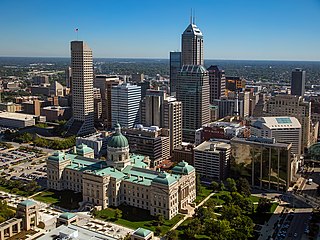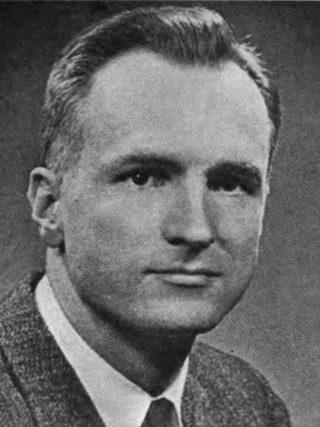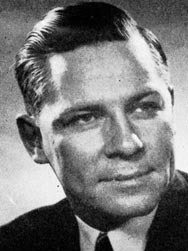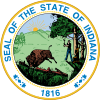
Indianapolis, colloquially known as Indy, is the capital and most populous city of the U.S. state of Indiana and the seat of Marion County. Indianapolis is situated in the state's central till plain region along the west fork of the White River. The city's official slogan, "Crossroads of America", reflects its historic importance as a transportation hub and its relative proximity to other major North American markets.

Unigov is the colloquial name adopted by the city of Indianapolis, Indiana, to describe its consolidated city–county government. By an act of the Indiana General Assembly, Indianapolis consolidated with the government of Marion County in 1970.

William Herbert Hudnut III was an American author and politician who served as the 45th mayor of Indianapolis from 1976 to 1992. A Republican, his four terms made him the city's longest-serving mayor. He had previously represented the Indianapolis area in Congress from 1973 to 1975 but was defeated in his race for a second term.
William John Wallace (1814–1894) was an Irish-American politician. He was the seventh mayor of the city of Indianapolis, Indiana, and the first Republican to hold that office.
Samuel Dunn Maxwell was an attorney and the eighth mayor of the city of Indianapolis, Indiana. Under his administration and guidance, Indianapolis Fire Department became a professional force.
Daniel Webster Grubbs was an American lawyer, businessman and politician who served as the 13th mayor of the city of Indianapolis, Indiana. Born in Henry County, Indiana, Grubbs moved to Indianapolis in 1857 to study law. His political career began in 1878 when he was elected alderman. Grubbs, a Republican, resigned in 1881 during his successful campaign for mayor. He served a single term (1881–1884) and did not seek re-election. Instead, he returned to his business career and moved to Parral, Mexico, where he managed the mining and banking interests of his wife's family.
Caleb Stone Denny was an American politician who served as the 15th and 17th mayor of the city of Indianapolis, Indiana. Denny first worked as a teacher and librarian before completing a law degree. He served as the assistant attorney general of Indiana from 1873 to 1875. In 1885, Denny resigned his position of city attorney to try to obtain the Republican nomination for mayor of Indianapolis. He ran successfully against incumbent mayor John L. McMaster and won the subsequent election by only 60 votes. Denny was reelected in 1887. He chose not to run in 1889 and Democrat Thomas L. Sullivan was elected as mayor. In 1892, Denny returned to politics and defeated Sullivan. He served a single term.

The Indianapolis mayoral election of 1967 took place on November 7, 1967. Richard Lugar defeated incumbent Democratic mayor John J. Barton, becoming the first Republican to be elected mayor of Indianapolis in nearly two-decades. Democrats had long dominated mayoral elections before 1967, having won ten of the thirteen mayoral elections since 1930. No Democrat would subsequently recapture the mayoralty until 1999, largely due to the city-county merger that created the Unigov in 1970 adding the votes of suburban Marion County, which shifted the composition the electorate towards the Republicans.

The Indianapolis mayoral election of 1971 took place on November 2, 1971. This was the first election after the creation of the Unigov. Incumbent Republican Richard Lugar was reelected to a second term. Lugar's challenger had been Democrat John Neff, a former state senator. Neff had campaigned in opposition to the Unigov, promising to seek its abolishment if elected.

The Indianapolis mayoral election of 1991 took place on November 5, 1991 and saw the election of Republican Stephen Goldsmith.

The Indianapolis mayoral election of 1979 took place on November 6, 1979 and saw the reelection of Republican William H. Hudnut III.

The Indianapolis mayoral election of 1983 took place on November 8, 1983, and saw the reelection of Republican William H. Hudnut III to a third term.

The Indianapolis mayoral election of 1987 took place on November 3, 1987, and saw the reelection of Republican William H. Hudnut III to a fourth term.
The Indianapolis mayoral election of 1963 took place on November 5, 1963 and saw the election of John J. Barton.
The Indianapolis mayoral election of 1959 took place on November 3, 1959 and saw the reelection of Charles H. Boswell, who had become mayor eleven months earlier, after Philip L. Bayt resigned to become Marion County Prosecutor. Boswell defeated Republican William T. Sharp.
The Indianapolis mayoral election of 1955 took place on November 8, 1955 and saw the election of Philip L. Bayt to a second non-consecutive term. Bayt's opponent was Republican James O. Birr.

The Indianapolis mayoral election of 1951 took place on November 6, 1951 and saw the election of Republican municipal court judge Alex M. Clark as mayor, defeating Democratic incumbent Philip L. Bayt. Clark became one of the youngest mayors in Indianapolis' history.
The 1925 Indianapolis mayoral election was held on November 3, 1925 and saw the election of Republican former Marion County treasurer John L. Duvall, who defeated Democratic former Indianapolis city attorney Walter Meyers.
Paul Francis Cantwell was an American politician, active in Indianapolis, who served as a Democratic member of the Indiana House of Representatives.









